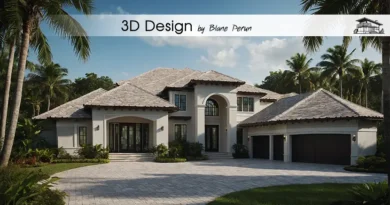Landscape Design Naples Fl
Landscape Design Naples, FL
Landscape design is an essential element of creating an attractive and functional outdoor space, and in a unique location like Naples, FL, it comes with its own set of opportunities and challenges. Known for its tropical climate and proximity to the Gulf of Mexico, Naples offers a stunning backdrop for designing landscapes that merge natural beauty with thoughtful human intervention. The ideal landscape design in Naples, FL, is one that harmonizes with the local ecosystem while enhancing the aesthetic appeal and utility of outdoor areas.
In this article, we will explore the critical components of landscape design in Naples, FL, focusing on the climate, flora, and the unique needs of local homeowners. We will also delve into specific aspects such as water management, plant selection, and the integration of outdoor living spaces.
Understanding the Naples, FL Climate for Landscape Design
Naples, FL, is known for its warm, tropical climate, which significantly influences landscape design choices. The hot summers, mild winters, and high humidity levels create both opportunities and limitations for landscape architects and homeowners.
Impact of Humidity on Plant Selection
One of the main factors to consider in Naples’ landscape design is the high level of humidity. Tropical and subtropical plants thrive in this environment, making it easier to create lush, green spaces. However, humidity can also contribute to the spread of mold and mildew, so it’s important to select plants that can withstand such conditions. Plants like hibiscus, bromeliads, and palms are excellent choices for the Naples climate due to their ability to thrive in humidity.
Choosing the right plants not only enhances the aesthetics but also reduces maintenance efforts. Homeowners in Naples should aim for plants that naturally thrive in the region to keep their landscape low-maintenance and sustainable.
Seasonal Considerations in Naples, FL
Naples experiences a tropical savanna climate, with distinct wet and dry seasons. These seasonal changes impact the types of plants that will flourish. During the wet season, from May to October, rainfall can be heavy, and landscape design must account for efficient drainage and erosion control. Conversely, the dry season, from November to April, requires drought-tolerant plants and irrigation systems to maintain vibrant landscaping.
A well-planned landscape design in Naples integrates plants that can endure the fluctuations in rainfall and temperature, such as native grasses, succulents, and drought-resistant shrubs.
The Role of Salt Tolerance in Coastal Landscape Design
Since Naples is situated near the Gulf of Mexico, salt tolerance is another critical factor in landscape design. Coastal winds can bring salt spray inland, which can harm sensitive plants. When designing landscapes near the coast, incorporating salt-tolerant species like sea grape, coco plum, and saw palmetto can help maintain a healthy and vibrant outdoor space.
Landscapes closer to the shoreline need to be fortified with plants that are specifically adapted to the salt-heavy environment, ensuring longevity and beauty even in these harsher conditions.
Essential Elements of Landscape Design in Naples, FL
Successful landscape design in Naples combines the natural environment with the practical needs of homeowners. From water features to plant selection and outdoor living areas, these elements must work in harmony to create an outdoor oasis.
Incorporating Water Features for Aesthetic and Functional Value
Water features are a popular addition to landscape designs in Naples. From serene fountains to stunning ponds, these elements can serve both aesthetic and functional purposes. Fountains, for example, add a luxurious feel while providing a cooling effect during the hot summer months.
In Naples, where rainfall is abundant during certain times of the year, water management becomes crucial. Incorporating rain gardens, retention ponds, or permeable paving systems helps control excess water, prevent flooding, and ensure that water features remain an attractive asset year-round.
Designing Outdoor Living Spaces
Outdoor living is a big part of the Naples lifestyle, and integrating functional spaces into your landscape design can enhance the value and enjoyment of your property. Popular features in Naples include outdoor kitchens, fire pits, and shaded lounging areas. These features are designed to withstand the tropical climate while offering a comfortable, stylish place to relax.
When planning an outdoor space, materials like weather-resistant wood, stone, and metal are essential for longevity. Additionally, installing retractable awnings or pergolas can provide much-needed shade during the sunniest parts of the day.
Sustainable Landscaping and Water Conservation
Water conservation is a significant concern in Naples due to the alternating wet and dry seasons. A sustainable landscape design prioritizes the efficient use of water resources through the selection of drought-tolerant plants and the installation of smart irrigation systems. Drip irrigation, rain sensors, and weather-based controllers help to optimize water use and reduce waste.
Incorporating xeriscaping principles, which focus on minimizing water use, can also be a great way to maintain a beautiful garden while being environmentally responsible. Mulching and grouping plants by their water needs are other strategies to promote water efficiency in Naples landscapes.
Best Plants for Landscape Design in Naples, FL
Choosing the right plants for a landscape in Naples, FL, can mean the difference between a thriving outdoor space and one that requires constant maintenance. Native plants are always a good choice, as they are adapted to the local climate and soil conditions.
Florida Native Plants for a Low-Maintenance Landscape
Florida native plants are ideal for creating a low-maintenance, eco-friendly landscape. These plants are well-adapted to the local conditions and typically require less water and care than non-native species. Examples include the firebush, coontie, and silver buttonwood, all of which thrive in Naples’ tropical climate.
Native plants also support local wildlife, providing food and shelter for birds, butterflies, and other pollinators. By incorporating native species, you can create a vibrant and sustainable landscape that benefits both you and the environment.
Exotic Tropical Plants for a Lush Landscape
While native plants offer practical benefits, many homeowners in Naples opt to incorporate exotic tropical plants for their striking beauty. Varieties like bird of paradise, banana trees, and heliconias add color and texture to a garden. These plants create a lush, tropical feel that matches Naples’ luxurious lifestyle and warm climate.
To maintain a balance between low-maintenance native plants and the aesthetic appeal of tropical varieties, consider blending both in your design. This can give your landscape a unique and personalized feel while still ensuring ease of care.
Shrubs and Hedges for Privacy and Structure
Shrubs and hedges play an important role in providing privacy, defining spaces, and adding structure to your landscape design. In Naples, popular choices for hedges include clusia, green buttonwood, and Japanese boxwood, which all grow well in the local climate.
These shrubs not only enhance the appearance of your garden but also serve functional purposes like creating natural borders, reducing noise, and offering shade. Using a combination of tall, dense shrubs and shorter, ornamental varieties can help create visual interest and depth in your landscape design.
Maintaining Your Landscape Design in Naples, FL
Proper maintenance is key to keeping your landscape design in Naples looking its best. With the right practices, you can ensure that your outdoor space remains beautiful and functional for years to come.
Managing Pests in a Tropical Climate
The warm, humid climate of Naples is ideal for plant growth, but it also attracts various pests. Insects like aphids, whiteflies, and spider mites can damage your plants if not properly managed. Regular inspection and the use of natural pest control methods, such as introducing beneficial insects or applying organic pesticides, can help keep your landscape healthy.
By staying proactive with pest management, homeowners can prevent infestations and ensure their landscape remains vibrant and pest-free.
Seasonal Pruning and Mulching
To keep plants healthy and thriving, regular pruning and mulching are necessary. Pruning helps remove dead or overgrown branches, encourages new growth, and maintains the shape of your plants. In Naples, where plants can grow quickly due to the climate, pruning is often needed more frequently than in other areas.
Mulching is another crucial practice that helps retain moisture, prevent weed growth, and protect plant roots from extreme temperatures. Organic mulches like wood chips or pine straw are ideal for Naples landscapes, as they decompose over time and improve soil quality.
Fertilization and Soil Management
The soil in Naples can vary from sandy to clay-like, so it’s important to test your soil and choose the right fertilization plan for your landscape. Using organic fertilizers or compost can improve soil health and provide essential nutrients to your plants. In some cases, amending the soil with materials like peat or perlite may be necessary to improve drainage or retain moisture.
By regularly fertilizing and managing the soil, you can ensure that your plants have the nutrients they need to grow strong and healthy in Naples’ challenging conditions.
FAQs
What are the best plants for landscape design in Naples, FL?
Native plants like firebush, coontie, and silver buttonwood are excellent choices for landscape design in Naples, FL. These plants are adapted to the local climate and require less water and maintenance. Additionally, exotic tropical plants such as bird of paradise and banana trees can be incorporated for added visual appeal.
How can I create a sustainable landscape design in Naples?
To create a sustainable landscape in Naples, focus on selecting drought-tolerant plants, using smart irrigation systems, and incorporating xeriscaping principles. These strategies help conserve water and reduce maintenance. Native plants, mulching, and grouping plants with similar water needs can also contribute to a sustainable design.
What is xeriscaping, and how does it apply to Naples, FL?
Xeriscaping is a landscaping method that reduces water use by incorporating drought-resistant plants and efficient irrigation systems. In Naples, where water conservation is important, xeriscaping can help homeowners maintain a beautiful landscape while minimizing water consumption.
How do I manage pests in my Naples landscape?
Regular inspections and the use of natural pest control methods, such as introducing beneficial insects or applying organic pesticides, are effective ways to manage pests in a Naples landscape. Common pests in the area include aphids, whiteflies, and spider mites, which can damage plants if not controlled.
How often should I prune my plants in Naples, FL?
Pruning frequency depends on the type of plants in your landscape, but in Naples’ tropical climate, plants tend to grow more quickly, meaning more frequent pruning is necessary. Regular pruning helps maintain the shape of plants, promotes new growth, and removes dead or overgrown branches to keep your landscape looking its best.


